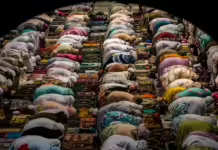Our city streets hum with dozens of dialects. Some people hear noisy competition; the gospel hears a song waiting for harmony. Acts 2, Ephesians 2, and Revelation 7 sketch the melody that guides the choir for the coming kingdom today.
Pentecost shows the first verse. Luke lists fifteen languages, yet no heavenly English. The Spirit does not erase accents; he dignifies every mother-tongue. Difference, then, is a palette God loves to paint with, not a defect to repair. Yet paint can harden into walls. Race, caste, tribe, and class cut grooves. Paul names the cure: “Christ himself is our peace.”
On the cross he absorbed centuries of hostility, tore down the barricade, and forged one new humanity. Peace, therefore, is more than polite smiles; it is shared blood, shared table, shared future. How do we practise that future now? First, listen long and speak little. Sit with a neighbour’s story until it unsettles your assumptions. Second, open generous tables. A pot of biryani or a basket of tortillas can preach louder than a sermon.
The Lord’s Supper itself is a multicultural meal—grapes from Mediterranean hills, grain from Middle-Eastern fields, now served on every continent. Third, pray in many tongues. When worship rises in Hindi, Marathi, Tamil Urdu and Bengali, hushed sighs of the Spirit, each voice joins the chorus. Sceptics call such peace naïve while wars rage and hashtags burn.
But Isaiah pictured swords hammered into ploughs, and Revelation hears every tribe singing before the throne. Every small act—teaching a refugee child to read, apologizing across a colonial wound, starting a choir that swaps rhythms—files another tooth off the world’s weapons. India offers a test case. Its 121 languages and diverse faiths can either clash like cymbals or blend like a raga. The church’s calling is to keep the music playing, inviting neighbours into the song. Let Christ tune our ears, stretch our love, and keep our table wide.








